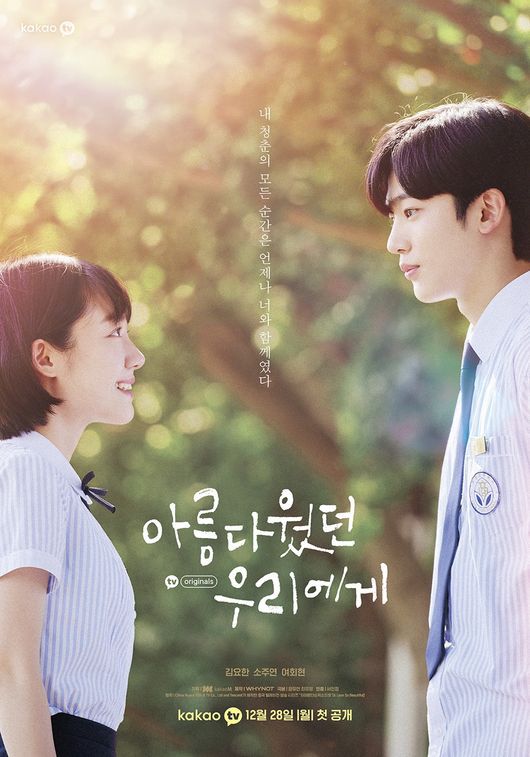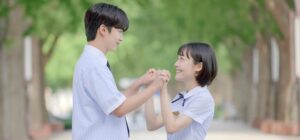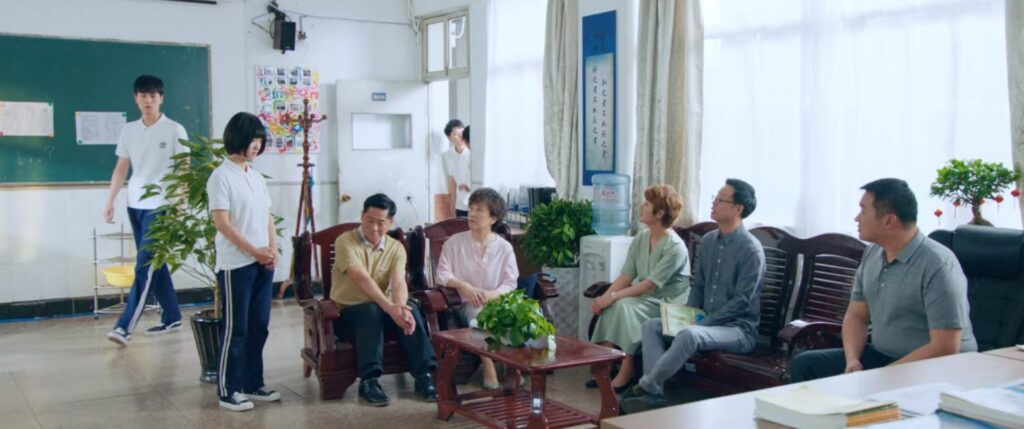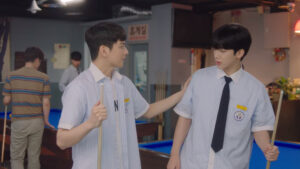
Hosted on KakaoTV and available on Netflix, A Love So Beautiful (2020) drew to a lighthearted end on 20 February 2021. The series is a Korean remake of the highly successful Chinese original in 2017.
A Love So Beautiful (2020) follows Cha-heon (Kim Yo-han from WEi), your typical quiet model student who is in every teacher’s good books, and Shin Sol-i (So Ju-yeon), a bright and puppy-like girl, as they journey through adolescence and adulthood.
This review contains spoilers.
As an adaptation, the Korean remake follows the original’s plot by capturing iconic moments of the drama—the female lead confesses (and gets rejected) in the same way, the key characters are all present, and other memorable lines and romantic gestures make the cut. One significant, undeniable difference, however, is the length of the drama.
Each episode is twenty minutes long, which is unsurprising for a drama hosted on a streaming site, but this comes at a cost. For better or for worse, the Korean remake has to sacrifice something, and this is where the beauty of the original is lost. In prioritizing plot and moments, the drama axes scenes of the characters’ introspection. We miss lingering shots of emotions and are instead cued by a quick pout or smile, signalling the characters’ reactions, and immediately transitioned to the next scene.

As a result, the episodes become formulistic. Sol-i is happy at the start. Something happens that makes her sad: she misunderstands Cha-heon’s behaviour, or she gets in trouble. Cha-heon does something to rectify the problem, usually a romantic act of kindness. Sol-i is then happy again and continues chasing after Cha-heon. Rinse and repeat.
Narratively, this is the structure of every episode of the Chinese original as well. But what sells the original is the depth of its characters. Viewers are reminded of their youthful days of immaturity, and every episode feels like they are acquainting themselves with a loyal and innocent group of friends.
In contrast, the Korean remake’s sacrifice of emotional beats reduces the characters to simplistic versions of themselves–Shin Sol-i is the girl that openly likes Cha-heon, Cha-heon is the quiet main lead who likes her back, Woo Dae-sung (Yeo Hoe-hyun) is the swimmer who one-sidedly likes Sol-i, Jeong Jin-hwan (Jeong Jin-hwan) is the class clown, and Kang Ha-young (Cho Hye-joo) is the cool girl.
Take for example, how the remake presents Sol-i’s imminent school transfer in Episode 6.
Throughout Episode 6, we see Sol-i being sad. She is chastised by the discipline master in the hallway, she is teased by a classmate for an embarrassing, public mistake she made, and she distances herself from Cha-heon out of humiliation.
Finally, the above scene: a meeting between her parents, the form teacher and herself regarding her school transfer. We know Sol-i is troubled, after all So Ju-yeon is shifting her eyes uncertainly in the scene. Simultaneously, however, we see the literature teacher exaggeratedly mouthing to her not to transfer; soon after, Cha-heon enters, with cheery light-hearted music in the background. Even though we know that this is a problem for Sol-i, it is difficult to take this conflict—the school transfer—seriously.
In fact, the drama does not want us to do so in the first place. This scene is packaged as a fleeting moment that showcases Cha-heon’s affection for Sol-i, as the soft lighting, close-up on expressions and drawn-out stare-down emphasize how much he wants her to stay.

There is nothing wrong with packaging the scene as such. After all, this is a youth romantic-comedy drama that does not need to take itself too seriously. But the flattening of conflict is a consistent pattern throughout the drama, and while it makes for a comfortable ride, any excitement and thematic depth are lost.
A quick comparison to the original shows the missed potential of this scene. In the original, this scene is the climax. Throughout the episode, we sympathise with the female lead, as she faces problems similar to the remake, but at higher stakes.
She is shouted at in front of the class for not paying attention, and the teacher demands to see her parents after her repeated mistakes. Her parents abruptly arrive in school as a result, and they see this as further reason for her to transfer schools. At her lowest point, she is finally asked in front of her teachers about what she really wants. It is at this moment that the male lead walks in, and discreetly whispers to her, “Don’t go”.
Everything, from the visual composition with the adults sitting, and her being the only one standing, to the scenes leading up to this moment, sell us the tension. We are worried, along with the male lead, that she will actually transfer schools, putting a separation in the budding romance. Even after she decides not to transfer, there are consequences. She vows to be in the top 15 to earn the right to stay in her school.
The Korean remake, however, does not sell the narrative’s conflict convincingly. Problems that arise are easily resolved without much consequence, and as a result characters suffer from flatness as they do not have reason to show raw emotions or to grow. This could be a stylistic choice as much as it is a pragmatic one due to time constraint. While the drama does not showcase realistic, moving characters, we are treated to puppy-love, high-school romance. It is still an adorable drama that has its cute moments, and makes for a feel-good watch.

Notably, the drama also modifies the characters from the original. Cha-heon, who is known for his tsundere coldness in the original, is a warmer and quieter male lead, and Sol-i who is characterized by her naive and clumsiness is reduced to a bright and sometimes embarrassed school girl. Woo Dae-sung is less of a chivalrous go-getter and more of a Mr Nice-guy. These are not flaws in the drama, and could have given these familiar characters new life–if only more nuance and depth were written into their experiences, as discussed earlier.
Ultimately, the Korean remake nails the fluff, and while it has nothing unique to offer, it works as a feel-good, comfortable ride that would serve as a good break from high-tension serials. At the same time, fans of the original looking for its beauty–the high school, retro nostalgia, the adorably competitive love triangle, the heartwarming tales of friendship and family–should be warned, as they will be sorely disappointed by the simplistic writing and characters of its Korean counterpart.
(YouTube, images via Netflix)


